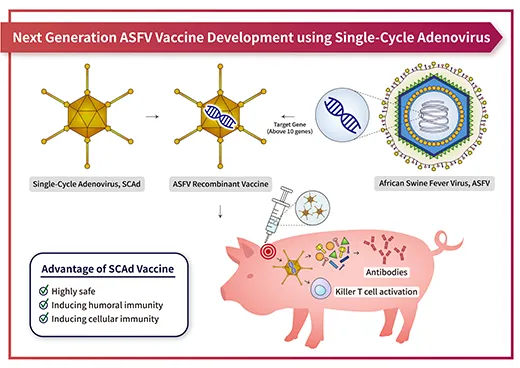Kansas State researcher works with South Korean company on ASF vaccine
by Global Ag Media
28 September 2020, at 1:00am
28 September 2020, at 1:00am
New vaccine development work at Kansas State University may soon help confront African swine fever (ASF), a disease that is endemic in sub-Saharan Africa. It has spread to different regions of Europe and Asia, causing devastating losses worth billions of dollars in China, Vietnam and other surrounding countries where pork is the most popular food item.

K-State is doing the vaccine development work through a sponsored research agreement facilitated by K-State Innovation Partners and MEDIAN Diagnostics Inc., or MDx, a veterinary medicine company based in South Korea. K-State Innovation Partners facilitates technology commercialization for the university.
"The technology we are utilizing is based on a novel adenovirus backbone — developed from human adenovirus serotype 6 — that can amplify a transgene up to 10,000 copies in the infected cell without producing infectious viruses," said Waithaka Mwangi, professor of diagnostic medicine and pathobiology in the university's College of Veterinary Medicine.
Mwangi said the technology of single-cycle adenovirus, or SCAd, allows a recombinant virus encoding a gene of interest to mediate protein expression in an infected cell in a similar manner as a replication competent virus but without producing infectious progeny — making it safe to use. This platform was originally developed at the Mayo Clinic.
"We believe this will be a way to deliver a safe and effective vaccine," Mwangi said.
Mwangi said that the single-cycle adenovirus vaccine platform can safely induce more robust and persistent immune responses compared to live, inactivated and subunit vaccines that are traditionally used.
"There are a lot of issues to be solved for commercializing an African swine fever virus vaccine and one of the main problems is safety," said JinSik Oh, CEO of MDx. "We should enhance the vaccine efficacy on the basis of guaranteed safety. We are convinced the SCAd technology is one of the most advanced and promising platforms to develop next-generation African swine fever vaccine candidates and Kansas State University is the best partner to cooperate with in the veterinary research and development area, so MDx made a decision to invest in this project."
MDx expects the formulation and testing of the new African swine fever virus vaccine candidate to be completed through this research and development project, which is entering the first year of funding and will continue through 2023.
Were African swine fever to enter the U.S., where there are millions of feral pigs and ticks capable of transmitting the virus, it could cause billions of dollars in economic losses to swine and other related industries according to animal disease experts. The pork industry in China and other parts of Asia is expected to take a long time to recover from the 2018 outbreak and the virus is expected to become endemic in Europe where it has infected wild boars.
From:https://www.thepigsite.com/articles/kansas-state-researcher-works-with-south-korean-company-on-asf-vaccine

K-State is doing the vaccine development work through a sponsored research agreement facilitated by K-State Innovation Partners and MEDIAN Diagnostics Inc., or MDx, a veterinary medicine company based in South Korea. K-State Innovation Partners facilitates technology commercialization for the university.
"The technology we are utilizing is based on a novel adenovirus backbone — developed from human adenovirus serotype 6 — that can amplify a transgene up to 10,000 copies in the infected cell without producing infectious viruses," said Waithaka Mwangi, professor of diagnostic medicine and pathobiology in the university's College of Veterinary Medicine.
Mwangi said the technology of single-cycle adenovirus, or SCAd, allows a recombinant virus encoding a gene of interest to mediate protein expression in an infected cell in a similar manner as a replication competent virus but without producing infectious progeny — making it safe to use. This platform was originally developed at the Mayo Clinic.
"We believe this will be a way to deliver a safe and effective vaccine," Mwangi said.
Mwangi said that the single-cycle adenovirus vaccine platform can safely induce more robust and persistent immune responses compared to live, inactivated and subunit vaccines that are traditionally used.
"There are a lot of issues to be solved for commercializing an African swine fever virus vaccine and one of the main problems is safety," said JinSik Oh, CEO of MDx. "We should enhance the vaccine efficacy on the basis of guaranteed safety. We are convinced the SCAd technology is one of the most advanced and promising platforms to develop next-generation African swine fever vaccine candidates and Kansas State University is the best partner to cooperate with in the veterinary research and development area, so MDx made a decision to invest in this project."
MDx expects the formulation and testing of the new African swine fever virus vaccine candidate to be completed through this research and development project, which is entering the first year of funding and will continue through 2023.
Were African swine fever to enter the U.S., where there are millions of feral pigs and ticks capable of transmitting the virus, it could cause billions of dollars in economic losses to swine and other related industries according to animal disease experts. The pork industry in China and other parts of Asia is expected to take a long time to recover from the 2018 outbreak and the virus is expected to become endemic in Europe where it has infected wild boars.
From:https://www.thepigsite.com/articles/kansas-state-researcher-works-with-south-korean-company-on-asf-vaccine







